Analytic Systems IBC320MW-36 Owner's manual
- Category
- Car battery chargers
- Type
- Owner's manual
This manual is also suitable for

INSTALLATION &
OPERATION MANUAL
IBC320MW
Intelligent Battery Charger
8128 River Way, Delta B.C. V4G 1K5 Canada T. 604.946.9981 F. 604.946.9983 TF. 800.668.3884 (US/CANADA)
www.analyticsystems.com
An ISO9001 and AS9100 Registered Company Battery Chargers • Inverters • Power Supplies • Voltage Converters

Copyright (2005-2015) Analytic Systems Ware (1993) Ltd.
Revised - July 12, 2017

3
IMPORTANT & SAFETY INSTRUCTIONS
SAVE THESE INSTRUCTIONS — this user guide contains important safety and operating
instructions for the battery charger.
BATTERY CHARGER PRECAUTIONS
1. Do not expose the battery charger to rain or snow unless it is a sealed model.
2. Use of an attachment not recommended or sold by the battery charger manufacturer may
result in a risk of re, electric shock, or injury to persons.
3. Do not disassemble the battery charger; return it to the manufacturer or an authorized
service center when service or repair is required. Incorrect reassembly may result in a
risk of electric shock or re. Voltages in excess of 350 volts are present inside the charger
anytime it is plugged into an AC outlet, even if it is switched off.
4. To reduce risk of electric shock, unplug the battery charger from the AC outlet before
attempting any maintenance or cleaning. Turning off controls will not reduce this risk.
5. Never place battery charger directly above battery; gases from battery will corrode and
damage battery charger.
6. Never allow battery acid to drip on the battery charger.
BATTERY SAFETY
1. WARNING — RISK OF EXPLOSIVE GASES
i. WORKING IN VICINITY OF A LEAD-ACID BATTERY IS DANGEROUS. BATTERIES
GENERATE EXPLOSIVE GASES DURING NORMAL BATTERY OPERATION. FOR THIS
REASON, IT IS OF UTMOST IMPORTANCE THAT EACH TIME BEFORE SERVICING
EQUIPMENT IN THE VICINITY OF THE BATTERY, YOU READ THIS USER GUIDE AND
FOLLOW THE INSTRUCTIONS EXACTLY.
ii. To reduce risk of battery explosion, follow these instructions and those published by
the battery manufacturer and manufacturer of any equipment you intend to use in
vicinity of battery. Review the cautionary marking on these products.
2. PERSONAL PRECAUTIONS
i. Someone should be within range of your voice or close enough to come to your aid
when you work near a battery.
ii. Have plenty of fresh water and soap nearby in case battery acid contacts skin,
clothing, or eyes.
iii. Wear complete eye protection and clothing protection. Avoid touching eyes while
working near battery.

4
iv. If battery acid contacts skin or clothing, wash immediately with soap and water.
v. If acid enters eye, immediately ood eye with running cold water for at least 10
minutes and get medical attention immediately.
vi. NEVER smoke or allow a spark or ame in the vicinity of a battery.
vii. Be extra cautious to reduce risk of dropping a metal tool onto battery. It might
spark or short-circuit the battery or other electrical part that may cause a re or
explosion.
viii. Remove personal metal items such as rings, bracelets, necklaces, and watches
when working with a lead-acid battery. A lead-acid battery can produce a short-
circuit current high enough to melt metal, causing a severe burn.
ix. NEVER charge a frozen battery.
x. If it is necessary to remove a battery from service, always remove grounded
terminal from battery rst. Make sure all accessories connected to the battery are
off, to prevent an arc when reconnecting the new battery.
xi. Be sure area around battery is well ventilated.
xii. Clean the battery terminals. Be careful to keep corrosion from coming in contact
with eyes.
xiii. Study all the battery manufacturer’s specic precautions such as removing or not
removing cell caps while charging and recommended rates of charge.
GROUNDING AND AC POWER CORD CONNECTION INSTRUCTIONS
The plug must be plugged into an outlet that is properly installed and grounded in
accordance with all local codes and ordinances.
DANGER Never alter the AC power cord or plug provided. If it will not t the
output, use an approved adapter or have the proper AC power cord installed by a
qualied electrician. Improper connection can result in the risk of electric shock.
Medical Equipment Notice
Analytic Systems does not recommend the use of the IBC Series Battery Chargers in
life support applications where failure or malfunction of this product can be reasonably
expected to cause failure of the life support device or to signicantly affect its safety or
effectiveness. Analytic Systems does not recommend the use of any of its products in
direct patient care. Examples of devices considered to be life support devices are neonatal
oxygen analyzers, nerve stimulators (whether used for anesthesia, pain relief, or other
purposes), auto-transfusion devices, blood pumps, debrillators, arrhythmia detectors
and alarms, pacemakers, hemodialysis systems, peritoneal dialysis systems, neonatal
ventilator incubators, ventilators for both adults and infants, anesthesia ventilators, and
infusion pumps as well as any other devices designated as “critical” by the U.S. FDA.

5
Specications
Input
Volts 85 - 265VAC, 1 Phase, 45 - 65 Hz
Current (max) * 4 Amps w. Inrush Protection
Input Fuse AGC 5 Amp
Power Factor > 0.99 at Full Load
Efciency > 90% at Full Load
* Maximum Input Current Specied at 85 VAC
Output
Nominal Voltage 12 VDC 24 VDC 32 VDC 48 VDC
Voltage Range ** 12.0 - 15.5 VDC 24.0 - 31.0 VDC 32.0 - 41.3 VDC 48.0 - 62.0 VDC
Output Current 20 Amps 10 Amps 7.5 Amps 5 Amps
Recommended Battery Amp-Hours 100 50 40 25
Standard Temperature Compensation -15mV/C -30mV/C -40mV/C -60mV/C
Number of Battery banks 1 or 2
Charging Stages 2 or 3 stage user selectable
End of Charge Float or Rest user selectable
** Actual Output Voltage determined by User Settings or by Charger Firmware
Mechanical
Dimensions 15.3”/38.8cm Long x 8.0”/20.3cm Wide x 3.25”/8.3cm High
Clearance 2.0”/5.0cm all around
Weight 11.2 lb / 5.1 kg
Material and Finish Marine Grade Black Anodized Aluminum with 18-8 Stainless Fasteners
Mounting Wall or Shelf Mount
Connections Integrated Color Coded Terminal Blocks
Environmental and Safety
Operating Temperature Range -25 to +40 C (-40 to +55 C Optional)
Storage Temperature Range -55 to +85 C
Humidity 0 - 95% Relative Humidity (non-condensing)
Vibration Built to meet MIL810g
Emissions Complies with FCC Class B, Part 15
Isolation > 1500 VDC Input-Output, Input-Case, Output-Case
Audible Noise None
Duty Cycle Continuous
Warranty Five Years Parts and Labor
Safety Built to meet ABS, CE, UL458 and CSA 22.2.107.1
* Specications subjects to change without notice.
Designed and manufactured by: ANALYTIC SYSTEMS WARE (1993) LTD.
8128 River Way
Delta, BC V4G 1K5 Canada
p. 604.946.9981 f. 604.946.9983
tf. 800.668.3884 US/Canada
www.analyticsystems.com [email protected]

6
Introduction
The IBC320 Intelligent Battery Charger delivers a full 300 watts of charging power to charge a
12, 24, 32 or 48 volt, one or two bank battery system (batteries must share a common ground).
The charger comes standard with easy to use color coded battery connection terminals.
The charger uses advanced Power Factor Correction circuitry on the AC input so it will work
from any standard AC voltage anywhere in the world and use the electricity in the most
effective and efcient way. LLC Resonant Converter technology allows Zero Voltage/Zero
Current switching on the Primary or high voltage side of the main power transformer, and
Active Rectication on the Secondary or low voltage side ensures maximum efciency and
the lowest Electromagnetic Interference (EMI) so the EBC320 will not interfere with sensitive
voice or data RF communication equipment.
The charger is preprogrammed for three standard types of Lead Acid batteries; Flooded
(traditional Lead Acid), AGM (Absorbed Glass Mat Lead Acid) and Gel or VRLA (Valve
Regulated Lead Acid). It also has a 4th that is preset for a typical Lithium Ion battery. Any of
the 4 charging proles can be adjusted to suit a specic make and model of battery using the
PowerWizard software that is free to download from www.analyticsystems.com.
The charger is supplied with one battery temperature sensor and a second sensor can be
added for two bank battery systems. Based on the temperature of the batteries the charger
will adjust its charging voltage for optimal charging. In the event a sensor is not used or
becomes faulty, the charger can be pre-set to one of three default battery temperatures, or
it can be programmed to automatically estimate the battery temperature by reading its own
temperature at the time it is turned on.
Eight dual color LEDs clearly indicate charging levels and stages as well as indicating faults
with either the charger or the batteries. The ‘PowerWizard’ software adds advanced charging
algorithm programming and charger monitoring as well as a graphing function through the
built in USB port.
Safety features include charger and battery over temperature shutdown, current limiting, short
circuit protection, input under voltage shutdown and output over-voltage protection all with
automatic recovery.
The charger requires no maintenance other than the occasional wipe down to remove any
accumulation of dust or dirt.
IBC320 Intelligent Battery Charger
USER GUIDE

7
Package Contents
The box should contain:
• One IBC320 Intelligent Battery Charger,
• AC cable, WASY .100026,
• Charger to battery cable assembly, WASY.100027
• Assembled molded battery temperature sensor-WL, SASY.100353
• One Mini-USB to Laptop cable
• This user guide (a pdf copy can be downloaded from www.analyticsystems.com)
• One Warranty Registration Card. Returning this card is not mandatory for warranty
coverage, but will assist us to stay in touch with you for updates and other news.
Warranty registration can also be completed at www.analyticsystems.com
• The ‘PowerWizard’ software can be downloaded from www.analyticsystems.com
If anything is damaged or missing, please contact us immediately at 1-800-668-3884 for by
emailing [email protected]
Location and Mounting
1. Mount the charger so that the indicator LEDs and controls on the front panel are
reasonably easy to see and access.
2. Make sure there is at least 2 inches of clearance all around the charger so that air can
circulate through the charger to keep it cool.
3. Mount the charger in a location that allows easy connection to the batteries. We
recommend using AWG10 wire to connect the charger to the batteries. That is the
maximum gauge of wire that the battery connection terminals will accept and provides
the best protection against vibration or breakdown of the wires over time.
4. If you are connecting the charger to two banks of batteries, they MUST share a common
ground. However, it is still a good practice to run a separate ground connection to each
battery from the charger.
5. Decide where to attach the battery temperature sensors. If it is practical, embed each
sensor into the battery platform so that the battery sits on top of it or if in a battery
box, slide it between the battery and the box, or simply use a little silicone to attach
the sensor to the top of the battery. Plug each sensor into the charger. It does not
matter which port is used, as the charger always sets its charging voltage from the
warmer battery. The charger will disconnect from the batteries if either battery reaches
43°C (110°F) and will automatically reconnect when the hottest battery cools to 32°C
(90°F). If the temperature sensors are not used, the charger will use the default battery
temperature programmed during Setup.
6. Make sure the charger is protected from water. In a marine environment, install the
optional drip shield above the charger if there is any possibility of water dripping onto it.
Installation

8
Connection
INSTALLATION INDICATORS
AC
POL
TEMP
25
DEV
CH
75
SVC
FLT
LO V
BAT
50
EQ
PS
AC PRESENTBATTERY POLARITY REVERSED
AC
POL
TEMP
25
DEV
CH
75
SVC
FLT
LO V
BAT
50
EQ
PS
1. Connect the charger to the batteries before connecting to the AC mains.
2. As you complete the connection to each battery, check the ‘POL’ indicator light on
the charger front panel. If it glows RED, the battery is connected in reverse. Stop and
reverse the connections to the battery (Red should go to Positive and Black should go to
Negative). After all battery banks are connected, double check that the POL indicator light
is still OFF.
3. Connect the charger to the AC mains. The AC LED should illuminate. This indicates that
the charger is receiving power from the AC mains and that the internal power supply is
running. Turn the charger OFF again.
INPUT POWER CONNECTION
This unit is eqiupped with a 3-pin connector, MS3114E12-3P or PTO7A-12-3P
Pin A: Hot Pin B: Ground Pin C: Neutral
OUTPUT CONNECTION
The unit is equipped with a 7-pin connector, GTS020R16S-1S.
Pin A: 24V
positive out
Pin B: Battery
temperature
sensor positive
Pin C: 24V
negative out
Pin D: 24V
negative out
Pin E: Battery
temperature
sensor negative
Pin F: 24V
positive out
Pin G: Battery
temperature
sensor signal.

9
Press the Power button on the front panel to turn the charger ON. The Power button will
illuminate once the charger has turned on. Once the startup routine is complete, enter Setup
mode by pressing and holding the PRG button for 3 seconds until you hear a one second beep
and the Charge LED starts blinking
Setup
Battery Type
Each press of the Select (SEL) button will advance the battery selection. The three LED’s on
the top will indicate Flooded, AGM and Gel, or Lithium Ion when lit.
Flooded – *The lead–acid battery was invented in 1859 by French physicist Gaston Planté
and is the oldest type of rechargeable battery. Despite having a very low energy-to-weight
ratio and a low energy-to-volume ratio, its ability to supply high surge currents means that the
cells have a relatively large power-to-weight ratio. These features, along with their low cost,
make them attractive for use in motor vehicles to provide the high current required by motors.
This is the Default setting.
AGM – **AGM (Absorbed Glass Mat) batteries differ from ooded lead acid batteries in that
the electrolyte is held in the glass mats, as opposed to freely ooding the plates. Very thin
glass bers are woven into a mat to increase surface area enough to hold sufcient electrolyte
on the cells for their lifetime. The bers that compose the ne glass mat do not absorb nor are
they affected by the acidic electrolyte.
Gel – **A modern gel battery (also known as a “gel cell”) is a VRLA (Valve Regulated
Lead Acid) battery with a gelied electrolyte; the sulfuric acid is mixed with fumed silica,
which makes the resulting mass gel-like and immobile. Unlike a ooded wet-cell lead-acid
battery, these batteries do not need to be kept upright. Gel batteries reduce the electrolyte
evaporation, spillage (and subsequent corrosion problems) common to the wet-cell battery,
and boast greater resistance to extreme temperatures, shock and vibration. Chemically they
are almost the same as wet (non-sealed) batteries except that the antimony in the lead plates
is replaced by calcium, and gas recombination can take place.
Lithium Ion – ***A lithium-ion battery (sometimes Li-ion battery or LIB) is a member of a
family of rechargeable battery types in which lithium ions move from the negative electrode to
the positive electrode during discharge and back when charging. Nominal cell voltage is 3.6V
and a 12V battery consists of 4 cells in series to create 14.4V. The charging routine is Constant
Current (Bulk Charge) to Constant Voltage (Float) at 14.4 Volts.

10
AC
POL
FLOODED
BAT
TYPE
GELAGM
GEL
BLINKING
BATTERY TYPE INDICATORS
FLOODED LEAD ACID
AC
POL
FLOODED
BAT
TYPE
GELAGM
ABSORBED GLASS MAT
AC
POL
FLOODED
BAT
TYPE
GELAGM
OTHER - DEFAULT L-ION
AC
POL
BAT
TYPE
CUSTOM
Depending on the size and type of the battery or batteries connected to the charger,
the standard charging current output of the charger may be more than is optimal or
recommended. Refer to the documentation from your battery manufacturer to determine the
maximum safe charging current. If needed, the maximum charging current can be reduced
to 25, 50 or 75 percent of the rated output of the charger. The three LED’s on the top will
indicate 25%, 50% and 75% respectively. All three LED’s will be simultaneously lit to
indicate 100% charging current (Default).
Power Limit
CHARGE POWER INDICATORS
MAX CURRENT 25% OF RATED
MAX CURRENT 75% OF RATED
BLINKING
MAX CURRENT 50% OF RATED
MAX CURRENT 100% OF RATED
AC
POL
25%
POWER
LIMIT
75%50%
AC
POL
25%
POWER
LIMIT
75%50%
AC
POL
25%
POWER
LIMIT
75%50%
AC
POL
25%
POWER
LIMIT
75%50%

11
The recommended charging voltage for any type of battery will vary with temperature.
The warmer the battery, the lower the charging voltage required. This adjustment will set
the battery temperature to use for charge compensation if there are no installed battery
temperature sensors.
The three top LED’s indicate Cold, Warm, Hot and Auto. Cold, Warm and Hot and correspond
to battery temperatures of 5, 21 and 38 degrees Celsius respectively. In Auto, the charger
measures its own internal temperature during startup, and estimates the batteries to be the
same temperature and applies the appropriate compensation (Default).
If the charger detects one or two battery temperature sensors, their measurements will take
precedence.
Default Battery Temperature

12
To save the conguration and exit Setup at any point in the process, press and hold the PRG
button for 3 seconds until you hear a one second beep.
Saving
To exit without saving, either press the On/Off button or do nothing. The charger will exit
the conguration mode without changing the stored conguration after 60 seconds elapses
without any button being pressed.
Exit without Saving
To restore the charger to its factory settings, press and hold both the PRG and EQL buttons for
10 seconds until you hear multiple beeps
Full Reset
Two additional adjustments can be made from the front panel. These are to select the charging
prole as well as the behavior of the charger at the conclusion of a recharge cycle.
Front Panel Adjustments
DEFAULT BATTERY TEMPERATURE INDICATORS
DEFAULT BATTERY TEMP 5C
POL
BAT
TEMP
AC COLD HOTWARM
BLINKING
AUTO BATTERY TEMP
DEFAULT BATTERY TEMP 21C
DEFAULT BATTERY TEMP 38C
POL
BAT
TEMP
AC COLD HOTWARM
POL
BAT
TEMP
AC COLD HOTWARM
POL
BAT
TEMP
AC COLD HOTWARM

13
The switch on the left selects a 2 Stage or 3 Stage charging prole.
A 2 Stage charging prole consists of charging the battery at a constant current until the
battery voltage reaches the Float Voltage. The charger will then maintain the battery at the
Float Voltage and the current will gradually taper down. The recharge is considered complete
when the charging current drops to 10% of the rated current of the charger.
A 3 Stage charging prole consists of charging the battery at a constant current until the
battery voltage reaches an elevated voltage called the ‘Absorption Voltage’. The charger will
then maintain the battery at the Absorption Voltage until the charging current drops to 10% of
the rated current of the charger OR a maximum of 3 hours (adjustable in the custom charging
prole).
The switch on the right tells the Charger what to do when recharging is complete.
Moving the switch to the Left tells the charger to Rest or switch to Standby when the recharge
is complete. The charger will remain in Standby until the power is cycled (either by the front
panel ON/OFF button, the Power Switch on the rear panel or by cycling the external breaker)
OR until the battery voltage drops to 90% of the rated voltage of the battery. Under any of
these conditions, the charger will initiate a new recharge cycle. This is the position the switch
MUST be in to meet the California Energy Commission regulations.
Moving the switch to the Right tells the charger to maintain the battery at the Float Voltage
indenitely. This will ensure that the battery is always fully recharged and ready for service. A
new recharge cycle will be initiated only if the charger is providing full rated current to keep
the battery at the Float Voltage OR if the power is cycled by any one of the three ways as
described above.
2 Stage / 3 Stage (STG) Prole Select
End of Charge (EOC) Function Select
100%
75%
50%
25%
0%
Bulk
(Constant Current)
Maintenance
(Constant Volts)
Time
Two Stage Charger
Volts
Amps
100%
75%
50%
25%
0%
Bulk
(Constant Current)
Absorption
(Constant Volts)
Maintenance
(Constant Volts)
Time
Three Stage Charger
Volts
Amps

14
Operation of the IBC320 charger is very simple. It is intended to operate fully unattended,
and will attempt to recover from any fault, such as Charger Over-Temperature, Battery Over-
Temperature, Insufcient Input Voltage, Power Failure and more.
In a xed installation, presumably the charger is already connected to the battery or batteries.
Once the battery is connected to the charger, conrm that the ‘POL’ LED is NOT illuminated.
Conrm that the ‘AC’ LED IS illuminated (Green) and press the Power button on the front
panel.
Operation
Note: The charger has two operating modes – Battery Charger and Power Supply.
If you are not sure which mode the IBC320 is in, check the indicator lights as
described in the ‘Power Supply Mode’ section, or press and hold the lighted Power
button for 3 seconds. If you hear two beeps, it is in Power Supply mode. If you hear
one beep, it is in Battery Charger mode. Make sure it is in the correct operating
mode for your requirements`
The charger will go through a startup sequence that consists of turning the 6 LEDs controlled
by the computer all Red, then all Green. The Power button will illuminate once the charger has
completely turned on.
The charger will begin to charge the battery or batteries according to the settings that were
selected during the setup. If no battery was detected during the startup of the charger, it will
not turn the outputs on and will indicate a failure.
If the AC power fails or is disconnected, the charger will resume charging the batteries when
AC is restored.
The IBC320 Charger is so efcient that is does not need a cooling fan to operate at maximum
performance. However, in a very hot ambient environment the microprocessor will reduce
power output as needed to keep the circuitry operating at a safe and reliable temperature.
In extreme cases, the charger may shut off completely until it cools sufciently to resume
operation.

15
Equalize Cycle
An equalize cycle is a deliberate overcharge of the battery at a low current to force an
undercharged cell to charge up to match the charge of the good cells in the battery. This cycle
should only be selected once every 6 months or thereabouts as it is hard on the good cells
of the battery and can cause water loss. Initiate an equalize cycle by pressing the Equalize
button. It is recessed onto the charger front panel to prevent accidental activation.
Once pressed, the Equalize light will come on ashing, indicating that an Equalize cycle has
been requested. The charger will wait until the current charge cycle is complete (charge LED
on solid), and the battery temperature is between 20 and 30 degrees C before the Equalize
cycle will start. Once the Equalize cycle starts, the Equalize LED and Charge LED’s will come
on solid and the charger will charge the battery at 10 percent of its rated current for a period
of 3 hours to a maximum voltage of 110% of the oat setting. Once complete, the charger
will return to the End of Charge mode. The Equalize cycle will also end if either battery
temperature reaches 40 degrees C.
The Equalize Function is not available if the charger cannot detect at least one battery
temperature sensor.
CHARGING INDICATORS
CHARGING CURRENT > 85% CHARGING CURRENT 60 - 84%
POL
AC TEMP
DEV
SVC
FLT
LO V
BAT
EQ
PS
CH
25 50 75
CHARGING CURRENT > 40 - 59% CHARGING CURRENT 11 - 39%
POL
AC TEMP
DEV
SVC
FLT
LO V
BAT
EQ
PS
CH
25 50 75
POL
AC
TEMP
DEV
SVC
FLT
LO V
BAT
EQ
PS
CH
25 50 75
CHARGE COMPLETE
POL
AC TEMP
DEV
SVC
FLT
LO V
BAT
EQ
PS
CH
25 50 75
POL
AC
TEMP
DEV
SVC
FLT
LO V
BAT
EQ
PS
CH
25 50 75
EQUALIZE PENDING
POL
AC TEMP
DEV
SVC
FLT
LO V
BAT
EQ
PS
CH
25 50 75
EQUALIZING
POL
AC TEMP
DEV
SVC
FLT
LO V
BAT
EQ
PS
CH
25 50 75
BLINKING
CHARGE CURRENT 1 - 10%
POL
AC TEMP
DEV
SVC
FLT
LO V
BAT
EQ
PS
CH
25 50 75

16
Power Supply Mode
The IBC320 charger can be switched to Power Supply Mode at any time by pressing and
holding the Power button for 3 seconds until you hear 2 beeps. This changes the operation of
the charger in the following ways.
1. The outputs will turn on regardless of whether a battery is detected or not.
2. The Output Power indicator LEDs will all blink any time the output current reaches 100%.
3. The output voltage is xed at the oat voltage for the battery type selected during Setup
(in case there is a battery connected).
4. The EOC switch and 2-3 Stage switch have no function.
5. There is no Equalize mode.
6. By use of the Power Wizard PC software, it is possible to customize the output voltage in
Power Supply mode within the working range of the unit. To do this, go through the setup
routine and select the Custom Battery prole. Then using the Power Wizard software,
connect to the charger and program the oat voltage for the Custom Prole to any volt-
age between 12.0 to 15.0 volts (scale appropriately for other charger output voltages).
The charger will remain in Power Supply mode until switched back to Charger mode by
pressing and holding the Power button for 3 seconds again until you hear 1 beep.
POWER SUPPLY INDICATORS
CURRENT < 10% CURRENT 11 - 39%
POL
AC
TEMP
DEV
SVC
FLT
LO V
BAT
EQ
PS
CH
25 50 75
CURRENT > 40 - 59%
CURRENT > 85%
CURRENT 60 - 84%
CURRENT = 100%
POL
AC
TEMP
DEV
SVC
FLT
LO V
BAT
EQ
PS
CH
25 50 75
POL
POL
AC
AC
TEMP
TEMP
DEV
DEV
SVC
SVC
FLT
FLT
LO V
LO V
BAT
BAT
EQ
PS
EQ
PS
CH
CH
25
25
50
50
75
75
POL
POL
AC
AC
TEMP
TEMP
DEV
DEV
SVC
SVC
FLT
FLT
LO V
LO V
BAT
BAT
EQ
PS
EQ
PS
CH
CH
25
25
50
50
75
75
BLINKING

17
Maintenance
Dry Contact Relay (option)
The charger requires no maintenance other than the occasional wipe down to remove dust
that could reduce its ability to dissipate heat, and carefully blow air through the cooling vent
to remove any dust buildup on it or inside the unit.
The charger can be tted with a 1 amp dry contact relay that can be used to indicate charger
status to a monitoring system. It has both a normally open and normally closed contact which
changes state depending on the presence of absence or charging voltage on the output of the
charger and is independent of the microprocessor. If the charger is producing voltage on the
output, the normally closed contact will be closed and there will be an electrical connection
between NC and COM. If the voltage on the output of the charger goes to zero, the contact
will change state. The Normally Open contact operates exactly in the reverse of the Normally
Closed contact.

18
Troubleshooting
The IBC320 charger is designed to provide years of reliable service. However in the event that
it does not seem to be operating correctly, here are some things you can check.
AC Present LED does not come on.
First make sure any external circuit breaker is ON. Unplug or turn off the external power to
the charger. Plug any other device into the AC receptacle or use a multimeter to make sure AC
is present. Remove the fuse and check for continuity with a multimeter. If the fuse is open,
replace it with the recommended fuse listed on the label and reconnect or turn the power back
on. The AC Present LED should come on. If it does not, then there is an internal failure and the
charger will have to be returned for service.
Battery Overtemp Indication
If the battery gets too hot during charging, the charger will stop and wait for the battery to
cool sufciently before resuming charging. If this happens frequently, particularly in relatively
normal ambient temperatures, the battery is likely damaged or defective and should be
replaced.
Battery Low Voltage Indication
If the battery is seriously discharged, and the charger voltage drops below 85% of nominal (ie.
10V for a 12V charger), the charger will show the Low Battery Voltage display until the battery
voltage exceeds 85% of nominal.
Battery Fail Indication
If the charger determines that the battery is defective and will not accept a charge, the
charger will stop attempting to charge the battery. This condition requires action on the part
of the user to replace the battery before the charger will resume normal operation. Cycling the
power switch to OFF and back ON again in any way will reset this condition and the charger
will attempt to recharge the battery again.
Charger Overtemp
If the charger gets too hot, it will switch to Standby until it cools sufciently to resume normal
operation.
Low Input Volts
If the input voltage drops below the minimum voltage necessary for normal operation, the
charger will show this display. The charger will switch to Standby and wait for the voltage to
recover
Charger Failed
IIf the processor detects a condition that prevents the charger from operating, it will show this
display. Try unplugging and re-plugging the power a couple of times to see if that clears the
problem. If it does not clear the display the charger will have to be returned for repair. More

19
information on the nature of the fault can be determined by connecting to the charger using a
laptop and using the Power Wizard program to see if a more detail error message is there
No Battery
If the charger is turned on without a battery connected, it will show this display. Simply
connect a battery to clear this fault. If a battery IS connected and you see this fault, it usually
means the battery is completely discharged. Try switching the charger to Power Supply mode
for a few minutes and then back to Charger mode to see if the battery will return to life. If it
doesn’t, the battery is defective and will have to be replaced.
Charger in wrong mode
The charger may be in Power Supply mode instead of Battery Charger mode. Make sure the
charger is in the Battery Charging mode by pressing the Power button for 3 seconds until you
hear 1 beep. If you hear 2 beeps, repeat until you hear 1 beep.
FAULT INDICATORS
BATTERY OVERTEMP BATTERY LO VOLTAGE
BATTERY FAILED CHARGER OVERTEMP
CHARGER FAILED
POL
POL
POL
POL
POL
AC
AC
AC
AC
AC
TEMP
TEMP
TEMP
TEMP
TEMP
DEV
DEV
DEV
DEV
DEV
SVC
SVC
SVC
SVC
SVC
FLT
FLT
FLT
FLT
FLT
LO V
LO V
LO V
LO V
LO V
BAT
BAT
BAT
BAT
BAT
EQ
PS
EQ
PS
EQ
PS
EQ
PS
EQ
PS
CH
CH
CH
CH
CH
25
25
25
25
25
50
50
50
50
50
75
75
75
75
75
CHARGER LO INPUT VOLTS
POL
AC
TEMP
DEV
SVC
FLT
LO V
BAT
EQ
PS
CH
25 50 75
NO BATTERY
POL
AC
TEMP
DEV
SVC
FLT
LO V
BAT
EQ
PS
CH
25 50 75
BLINKING

20
Abbreviations and denitions
We use a number of abbreviations on the labels to save space. Here are the full words corre-
sponding to each abbreviation along with common battery charger terms and their denitions:
ABBREVIATIONS
POL – Polarity. Refers to the correct connection of the Positive and Negative terminals of the
battery to the charger.
DEV – Device. Refers to the charger. Used together with the Fault LED to indicate a problem
with the Device.
BAT – Battery. Refers to the battery. Used together with the Fault LED to indicate a problem
with the Battery.
FLT – Fault. Used to indicate a problem with the battery (BAT) or the device (DEV) AC – Alter-
nating Current
TEMP – Temperature. Used to indicate that either the Battery or the Device is too hot.
LO V – Low Voltage. Used to indicate that either the Input Voltage or the Battery Voltage is too
low.
FAIL – Used to indicate that either the battery or the device needs repair or replacement.
PRG – Program - Button used to initiate the Programming Mode
STG – Stage – Switch used to select between 2-Stage or 3-Stage charging prole
EOC – End Of Charge – Switch used to select Rest or Float at the end of a charge cycle
SEL – Select – Button used to make choices during front panel programming CH – Charging
EQ – Equalize
PS – Power Supply
DEFINITIONS
• CC – Constant Current. Typically the rst phase of a recharge cycle where a constant
current is delivered to the battery until the voltage reaches a specic level.
• CV – Constant Voltage. Typically the 2nd or 3rd phases of a recharge cycle where the
battery voltage is maintained at a constant level.
Page is loading ...
Page is loading ...
Page is loading ...
Page is loading ...
-
 1
1
-
 2
2
-
 3
3
-
 4
4
-
 5
5
-
 6
6
-
 7
7
-
 8
8
-
 9
9
-
 10
10
-
 11
11
-
 12
12
-
 13
13
-
 14
14
-
 15
15
-
 16
16
-
 17
17
-
 18
18
-
 19
19
-
 20
20
-
 21
21
-
 22
22
-
 23
23
-
 24
24
Analytic Systems IBC320MW-36 Owner's manual
- Category
- Car battery chargers
- Type
- Owner's manual
- This manual is also suitable for
Ask a question and I''ll find the answer in the document
Finding information in a document is now easier with AI
Related papers
-
Analytic Systems IBC320-12 Owner's manual
-
Analytic Systems BCA1505MW-48 Owner's manual
-
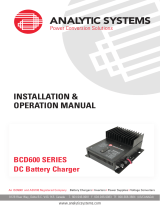 Analytic Systems BCD600-32-12 Owner's manual
Analytic Systems BCD600-32-12 Owner's manual
-
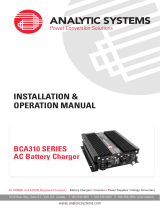 Analytic Systems BCA310-220-32 Owner's manual
Analytic Systems BCA310-220-32 Owner's manual
-
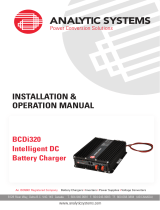 Analytic Systems BCDi320-24 Owner's manual
Analytic Systems BCDi320-24 Owner's manual
-
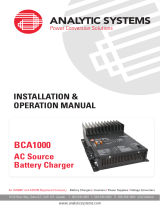 Analytic Systems BCA1000-110-72 Owner's manual
Analytic Systems BCA1000-110-72 Owner's manual
-
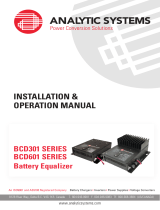 Analytic Systems BCD301-24-12 Owner's manual
Analytic Systems BCD301-24-12 Owner's manual
-
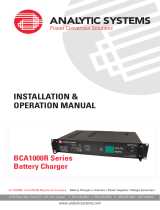 Analytic Systems BCA1000R-220-24 Owner's manual
Analytic Systems BCA1000R-220-24 Owner's manual
-
Analytic Systems BCD315-12-48 Owner's manual
-
Analytic Systems IBC320-12 Owner's manual
Other documents
-
AGM X2 Max Hard reset manual
-
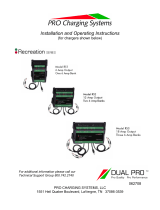 pro.point RS3 User manual
pro.point RS3 User manual
-
AGM A8 Hard reset manual
-
Panasonic Power Supply CGR18650AF User manual
-
AGM A9 Hard reset manual
-
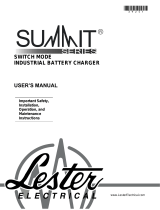 Lester SUMMIT 27790 User manual
Lester SUMMIT 27790 User manual
-
Kensington K38066 User manual
-
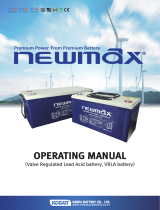 NEWmax SG1000H Accumulator Battery User manual
NEWmax SG1000H Accumulator Battery User manual
-
Duracell DRMC2A 2Amp Battery Charger + Maintainer User manual
-
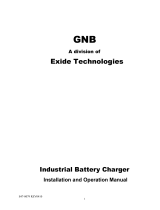 GNB S47-0079 User manual
GNB S47-0079 User manual

































